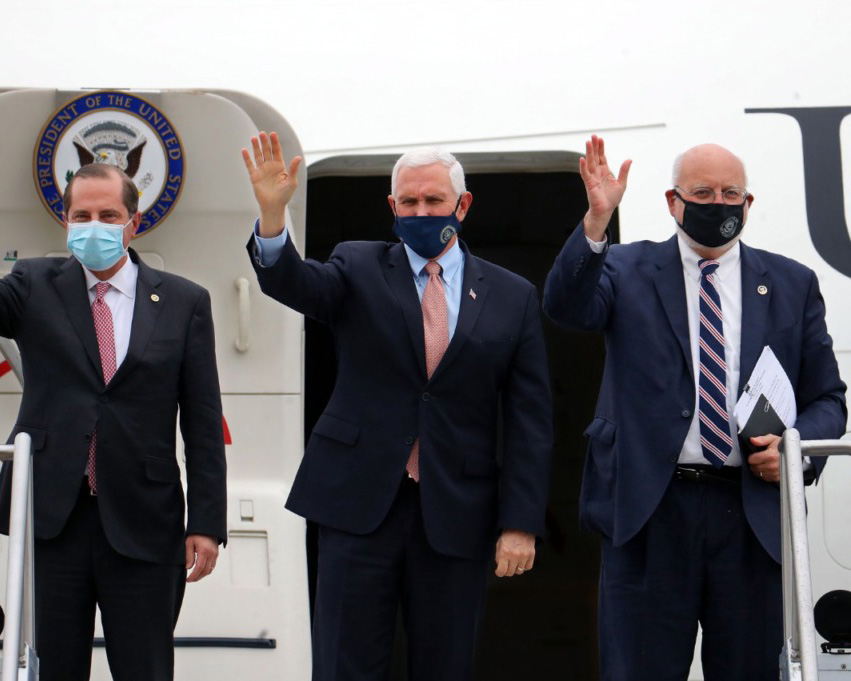
Peter Zeihan: The Russian Breakdown
Should the war in Ukraine result in a Russian loss, what will the future hold for Russia? Well, we know the road ahead for the…
Thought Leader: Peter Zeihan

If the coronavirus were just another cold or flu virus, herd immunity could probably be achieved at 70%.
This virus is so much more contagious, Dr. Robert Redfield expects the world is looking at 85% to 90% “to shut this down.”
“That’s my own personal speculation,” Redfield said in an hourlong Zoom conversation Monday, Dec. 14, with Dr. Scott Strome, executive dean of the College of Medicine at the University of Tennessee Health Science Center.
The two were colleagues at the University of Maryland from 2005-2018. Strome was head of otorhinolaryngology; Redfield co-founded the university’s institute of human virology and was chief of infectious disease.
Redfield, now head of the Centers for Disease Control and Prevention, talked about the highs and lows of the national nightmare from the perspective of a leader whose time at the helm will forever be tied to COVID-19 and 2020.
The months ahead, he said, are likely to be the worst from a public health perspective “in the history of the nation.”
“I do think we see the light at the end of the tunnel. But it’s going to be a long tunnel until we get the American public fully vaccinated.”
Redfield spoke on the day the first American, an African American nurse in New York, received the first COVID-19 vaccine in the United States.
With the Pfizer vaccine alone, Redfield predicts the U.S. has capacity to vaccinate 100 million people by March 1, and 100 million more by June 1.“But a new vaccine would help us be able to get up to 330 million people by June-July,” he said.
The new vaccine will likely be the Moderna vaccine, which has not yet received emergency-use authorization from the FDA.
Without it, Redfield expects it will be late fall before the entire nation has had a chance to be vaccinated.
The question then, Redfield said, is how long the pandemic will continue if enough people don’t take the vaccine. He hopes for a 95% participation rate. National polls say now more than 80% are disposed to getting the shots.
“Certainly, if the American public doesn’t take it, we’re not going to put this pandemic behind us,” Redfield said. “It will probably continue for another couple of years until natural infection takes care of the individuals who don’t want to get vaccinated.”
Redfield, who is a virologist, has no difficulty telling the world he believes immunizations are the greatest contribution modern science had made to modern medicine.
“People should not leave it on the shelf. They need to embrace if for themselves, their family and their communities, whether it’s the flu vaccine, which less than 50% of Americans take.”
Measles is even worse now, with less than 25% of schoolchildren in some schools protected by the shot.
“The ability of us to put this pandemic behind us now is no longer a scientific problem, it’s going to be strictly whether the American public embraces this vaccine so we can get everybody vaccinated by, I’m saying the third quarter of 2021.”
There have been missteps along the way, and Redfield was criticized when the CDC vacillated on issues as central as whether the virus was airborne or not, what constituted close contact and whether students are safer in school or studying at home.
The “overarching” lesson so far, Redfield said, is getting the message right and being united in it.
“You can put anything on a blank tablet, and it sticks. But once you have something on the tablet and you want to change it, you know, it’s very difficult for the American public or anyone,” he said. “It doesn’t stick as well.”
It may have been an admission that shifts in CDC thinking not only confused the public but left it thinking the U.S. government wasn’t fully grounded in how it was managing the pandemic.
“When the messaging isn’t consistent and spot on, I do think you end up paying a significant price for that,” he said.
The other lesson, Redfield said, was how long it took the private sector to get involved in creating laboratory-developed tests.
“We made the formula public. They could have gone with EUA’s (emergency-use authorizations) and the FDA agreed to give them regulatory discretion. The private sector couldn’t really move quickly in developing tests,” he said.
If the public and private sector had worked better together in the U.S., mass testing would have rolled out sooner.
Redfield also said the inability to work with China stymied the U.S., although he had arranged for the U.S. to go to China in the first week of January “to try to understand what was going on with this new pulmonary illness.”
When the visit was denied, the U.S. didn’t learn “certain critical issues,” including how contagious the virus is.
“At the same time, the Chinese were saying there was no evidence of human-to-human transmission,” Redfield said. “The second thing they were saying was that it was a symptomatic disease.”
Having firsthand knowledge, early on, he said would have shown that transmission happens with both symptomatic and asymptomatic patients.
“And we would have learned this is probably one of the most infectious viruses we have ever seen.”
The strategy of focusing almost entirely on symptomatic people delayed the understanding of the importance of “aggressive community testing.”
If that had been launched in January or February, “we’d have a different pandemic. Now, we are really looking at the value of testing entire communities.”
To ease the immense strain on the hospital system, he is pushing for build-out of infusion centers, where people at risk of serious outcomes after being diagnosed could be treated with remdesivir.
“That’s going to have a big impact on whether those people end up in the hospital,” he said.
He also said antibody infusions should happen at home or in infusion centers before hospitalization.
“If you wait to use antibody therapy once you’re already sick enough to be in the hospital, that’s not when we use antibodies,” Redfield said. “Once you’re in the hospital, you need to focus largely on anti-inflammation.”
Tennessee, he learned when he visited Memphis with Vice President Mike Pence in early December, is setting up five infusion centers.
“I tell you, most of the states haven’t gotten there. I’ve been out for the last week and a half, two weeks, sort of begging people. ‘The CDC just put out a new statement, please use these therapies before you go to the hospital.’’’
He noted that Medicare has set up a waiver so hospitals can be reimbursed for treating people in their homes and that EMTs may soon be allowed to treat COVID patients instead of transporting them.
Redfield minced no words in his worry about the crush on the U.S. hospital system.
“I think hospitals now have to be waiving credentials for retired doctors and nurses and getting them in to work. You need to be reallocating your medical students and nursing students and getting them in the system right now,” he said, noting the nation has more than 100,000 hospitalized COVID-19 patients.
“I think if you wait until you have to put gurneys in the parking lot, it’s a little too late. Nothing is going to change the kinetics of this outbreak for the better right now for the next four to 12 weeks.”
Redfield, who will be replaced when the Biden administration is installed, ended his talk with Theodore Roosevelt’s immortal words:
“It’s not the critic who counts, not the man who points out how the strong man or woman stumbles nor the doer of deeds could have done them better. The credit belongs to the person who’s actually in the arena …”
He also admitted he was crestfallen over the election results, though not for political reasons.
“I was downtrodden because I was the CDC director and I was going to be leaving the job right when epidemic was at its worst. And it wasn’t very satisfying,” Redfield said.
When Pfizer and Moderna results came out with efficacies of 95% and 94%, he was jubilant, knowing that he was guiding the CDC when the vaccine program began.
“And my successor will take it from there. And hopefully by the summer or early fall, the COVID-19 pandemic of 2020s will be over.”
Peter Zeihan: The Russian Breakdown
Should the war in Ukraine result in a Russian loss, what will the future hold for Russia? Well, we know the road ahead for the…
Thought Leader: Peter Zeihan
Newt Gingrich: Economic Momentum Building Toward 2026
Former House Speaker Newt Gingrich highlights the importance of President Donald Trump’s address on ‘Hannity.’ Few figures in American politics bring the depth of insight…
Thought Leader: Newt Gingrich
Eyck Freymann: Building an Allied Stockpile for Critical Minerals
China’s dominance in critical minerals allows Beijing to manipulate supply, shift prices, and coerce foreign industries, forcing factory shutdowns and undercutting global resilience. Private companies…
Thought Leader: Eyck Freymann

